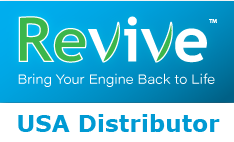Isn't Revive Just Another Fuel Additive?
No, unlike additives that get poured into the fuel tank, Revive is injected into the engine air intake when the vehicle is running.
Why do Engines Need Cleaning?
Despite recent improvements in engine efficiency the fuel is still not 100% burnt, this can be seen as soot deposits in the end of the exhaust pipe. This same soot also collects in various hidden places around the engine's system.
Modern engine designs need more parts to deal with environmental and fuel economy demands put on vehicles. These same parts are prone to failure due to the build-up of deposits. Once they get stuck or blocked the part can not operate as it was designed to and can cause various different symptoms.
What Symptoms Will I See?
As a driver you may see any combination of the following: Smoking exhaust. Engine warning lights and messages 'Check Engine'. Increased fuel usage. Failed smog emissions test. Poor performance / pickup. Limp home mode.
(Limp home mode - the computers that control the engine can restrict how fast it runs and how much power you get from it, often occurring whilst overtaking. This lets you get your car to a garage without causing more damage, you will also see the 'Check Engine' light)
Will Revive Fix The Problem?
Yes, but it does depend on the cause of the problem, if it is soot build-up related then Revive has a very good record of helping. Your shop may recommend trying Revive first, rather than going down a more expensive repair route. If the build-up is very bad, you may need to apply two treatments. Prior to making a purchase please carry out some basic diagnostic tests first. Using suitable equipment, check for vacuum leaks in related solenoids and actuators. Scan for diagnostic trouble codes to identify the fault area. If you are unsure seek advice from an ASE certified technician. Revive is extremely effective at removing sooty carbon deposits from variable geometry turbochargers, however, it cannot compensate for split vacuum pipes, mechanically worn or seized components.
Can I Prevent Soot Build-up?
Yes, a Revive maintenance clean at each service will help prevent oil and soot building up in the first place and may stop the need for costly repair work in the future. Try our 300ml Service Shot!
Are Diesel Engines Worse Than Gasoline Engines?
Yes, because diesel engines produce more particles of soot than a gasoline engine, there is a far higher chance of your engine suffering carbon/soot build-up.
Will the size or type of my engine require different applications of Revive?
Yes, engines under 5 liters need our Starter Kit, engines 5 liters and larger will require our Big T Kit.
We offer refill bottles so you do not have to purchase multiple Big T or Starter kits if you want to apply Revive again in the future.
What are Variable Geometry Turbochargers?
More and more diesel vehicles have very efficient turbochargers fitted to them called Variable Geometry / Nozzle / Vane turbochargers. These change how the dirty exhaust gas gets directed inside the turbocharger as you drive. These movable parts are very prone to getting clogged up and stuck, then failing to work properly, causing reduced power, poor drivability / pickup and 'Check Engine' warnings on the dashboard. Diesel turbocharger cleaning performed with Revive can help prevent and cure these problems.
Why are Turbocharger Problems so Expensive?
Turbochargers are high precision parts and are often put in hard to reach places, this takes the mechanic more time to remove and reinstall and makes replacing an already expensive turbocharger a very costly job. This is why a Revive clean is often the first thing recommended to try and solve the problem without the expense.
What are Revive Service Cleans?
Preventative Revive cleans are performed each time you have your vehicle serviced by your shop or mechanic. These help keep your engine running as it was designed, fuel economy and performance up and may prevent the inconvenience of an expensive repair.
Will Revive harm any part of the engine?
The short answer is “no”....
The quality is rigorously controlled, with each and every batch of fluid being put through a series of tests to ensure that the mix is correct and that nothing has got into the batch that could cause any harm to any of the metals or seals in the engine. The tests are pH level, alkaline metal content, chlorides, specific gravity and the freeze point.
The fluid is non flammable, has no oxidizing properties and is neither acid or alkali. It is also non-toxic.
The product is a variant of a cleaning fluid that is used for Rolls Royce and other aero engines. It is also used in the gas turbines that drive some of the world's largest power stations, and as such is manufactured to the very highest standards.

